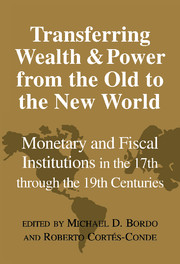 Transferring Wealth and Power from the Old to the New World
Transferring Wealth and Power from the Old to the New World Published online by Cambridge University Press: 27 March 2010
The chapters in this collection examine the factors that allowed efficient fiscal and monetary institutions to develop in some countries at certain moments in time, while in others such development turned out to be unsuccessful. They also deal with the reasons why some governments were able to live within their means and provide public goods, while for others expenditure often exceeded revenue, financial difficulties were the norm, and, in the face of extraordinary shocks, fiscal crises arose.
On monetary issues, the collection considers the evolution of institutions designed to save on transaction costs, the extent and the manner in which sovereigns resorted to money finance (seigniorage), and the effects of this instrument on economic stability and development.
The collection compares the evolution of the fiscal and monetary regimes of the Old World countries from the seventeenth to the nineteenth centuries with the experiences of countries in the New World. The objective is to see how such fiscal and monetary institutions were transferred from the Old World to the New during the colonial era and how old institutions were modified or replaced by new ones. In addition, the chapters in this collection consider the experience of the colonies after they became independent countries.
The creation of efficient fiscal institutions involved the transition from regimes where sovereigns financed themselves with resources derived from their own lands (the demesne) or from their feudal rights (the patrimonial state) to a new regime where the rising expenditures of the new national states required resources to be exacted from their subjects (the tax state).
To save this book to your Kindle, first ensure [email protected] is added to your Approved Personal Document E-mail List under your Personal Document Settings on the Manage Your Content and Devices page of your Amazon account. Then enter the ‘name’ part of your Kindle email address below. Find out more about saving to your Kindle.
Note you can select to save to either the @free.kindle.com or @kindle.com variations. ‘@free.kindle.com’ emails are free but can only be saved to your device when it is connected to wi-fi. ‘@kindle.com’ emails can be delivered even when you are not connected to wi-fi, but note that service fees apply.
Find out more about the Kindle Personal Document Service.
To save content items to your account, please confirm that you agree to abide by our usage policies. If this is the first time you use this feature, you will be asked to authorise Cambridge Core to connect with your account. Find out more about saving content to Dropbox.
To save content items to your account, please confirm that you agree to abide by our usage policies. If this is the first time you use this feature, you will be asked to authorise Cambridge Core to connect with your account. Find out more about saving content to Google Drive.